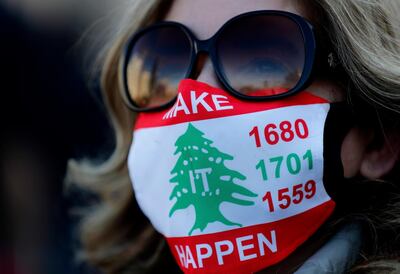Thousands of families in Lebanon can no longer afford to buy food. Between a collapsing economy, damage to the capital following the port explosion last August, and soaring Covid-19 cases, Lebanon teeters on the brink.
While the social and economic climate has reduced the quality of life for everyone in the country, women and girls have been disproportionately affected in ways both obvious and invisible.
A vast majority of those with intersecting vulnerabilities – migrant workers, women with disabilities and other marginalised women – no longer have access to basics rights, which allow them to contribute to the labour force, their communities and their families. Many have become unable to process or adapt to the rapidly deteriorating situation, adding to the country's mental health crisis.
These intersecting vulnerabilities are exacerbated in the current situation. The Lebanese pound has lost over 90 per cent of its value since September 2019. Food has become unaffordable for too many, and the prices of sanitary products have risen by as much as 500 per cent. One Bangladeshi migrant worker described sanitary pads as "among those expensive things that we can no longer afford". Another woman described them as a "monthly necessity" that she and people in her situation are having to do without.
Women who can no longer afford menstrual pads have limited mobility, and face discomfort and stigma for up to seven days every month. According to a Unicef report, when girls' menstrual health needs are unmet, it affects their school attendance, participation in community life and compromises the safety of women, which adds to stress and anxiety. Women's jobs are disrupted as a result.
There are several humanitarian actors in Lebanon providing relief to women whose circumstances have been hampered by Lebanon's compounding crises. One such organisation is Fe-Male, which has provided 1,800 women across Lebanon with menstrual hygiene kits since August. These women include migrant domestic workers, those affected by the Beirut blast, refugees and women with disabilities.
There are added pressures on women, in both the public and private spheres. In their homes, they are often sole breadwinners and homemakers, expected to continue these roles, along with earning an income during pandemic restrictions.
The lockdown has been traumatic for those who have had to remain confined with their abusers, leading to an increase in domestic violence. Every day across the world, there are 137 cases of women being killed. When it comes to femicide, Lebanon is no exception. According to UN data, more than 50 per cent of women and girls killed by men die at the hands of their current or previous partners.
Studies have shown that gender-based violence increases during a crisis. Lebanon’s Internal Security Forces have reported a 96.5 per cent increase in domestic violence helpline calls. As for women’s unemployment, the rate almost doubled, from 14 to 26 per cent. For those women with dangerous partners, this means more time at home with abusers.
In the public sphere, things are not much better. Women make up half the population, and yet are not represented in governmental crisis response strategies. This was evident in Lebanon’s Covid-19 response plan, developed by the government of caretaker prime minister Hassan Diab, with little or no consideration for the most vulnerable.
One example is the disruption of Lebanon's exploitative Kafala system, which relies heavily on transactions in US dollars between employers and migrant workers or their families.

While activists have, for over a decade, advocated the dissolution of this system, current disruptions only harm migrant workers, who are either not being paid or are stuck in Lebanon without employment or a ticket back home.
The economic collapse has decreased the incoming migrant workforce by 75 per cent in 2020 compared to 2019. This is compounded by the government's "voluntary return" initiative, which puts the onus on workers to co-ordinate with their respective embassies so that they can return to their countries of origin. This has left many workers stranded on sidewalks outside their embassies, with no food or money.
The Lebanese authorities need to develop a participatory, gender-inclusive crisis response strategy that recognises women and girls as primary victims of the ongoing emergency.
While civil society actors in Lebanon are some of the most active globally, they cannot replace the government and cannot act on its behalf, more so in a patriarchal hierarchy that restricts women’s agency and limits their civil, political and social engagement.
The intersection between sectarian politics, religious institutions and social structures in Lebanon have, over time, created a toxic environment. This can only be stopped at the source. Lebanese public officials need to ensure women and girls’ access to health and hygiene products, health centres and helplines. Impoverished women need to be prioritised in the government's relief plans. They need to be provided with healthcare, unemployment benefits and social security.
Among Lebanon's many crises, this one, too, needs to be addressed urgently.
Aliaa Awada is a feminist activist and co-director of the NGO Fe-Male, based in Lebanon


